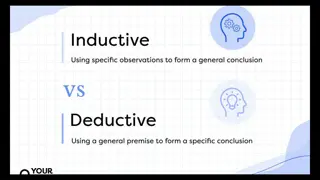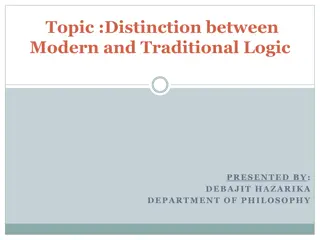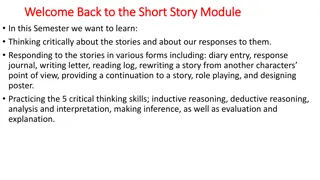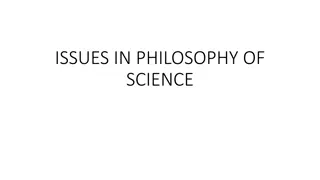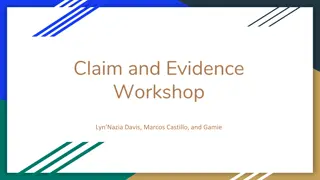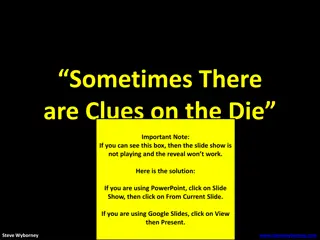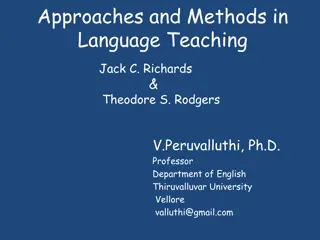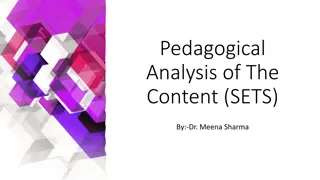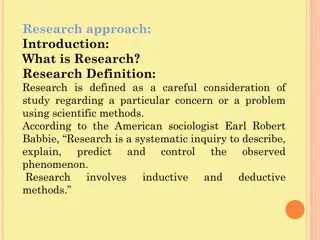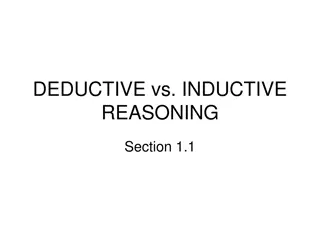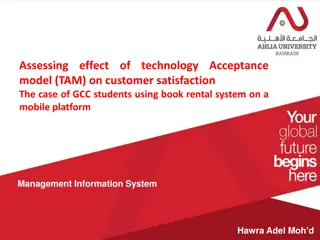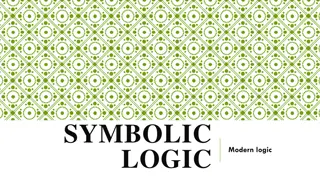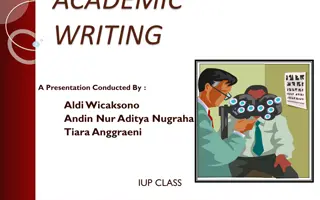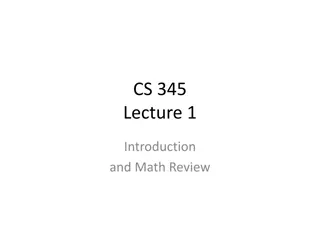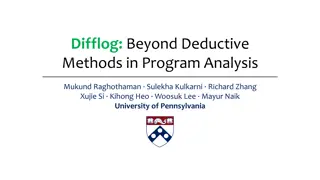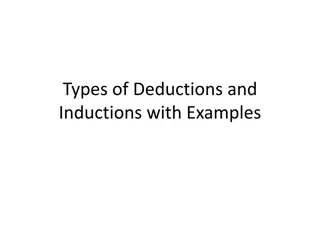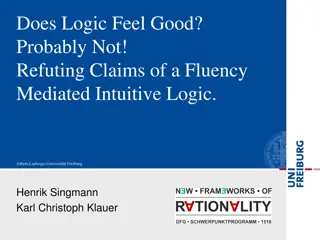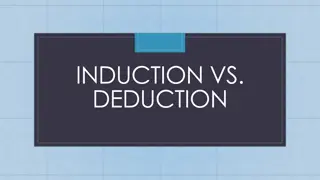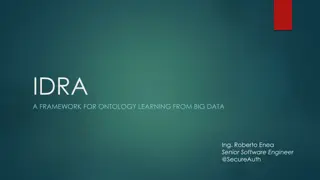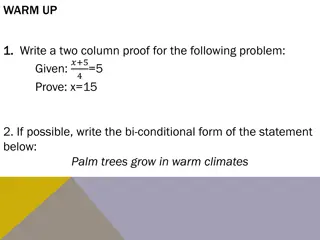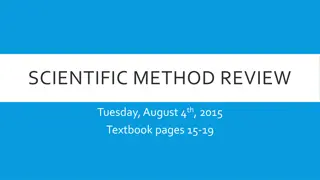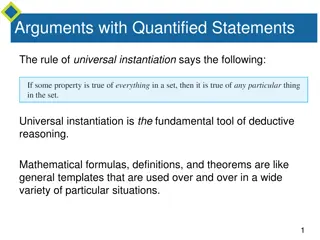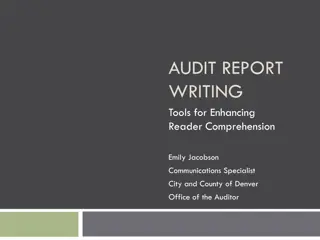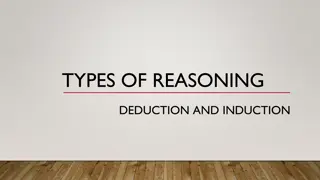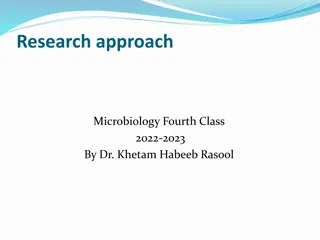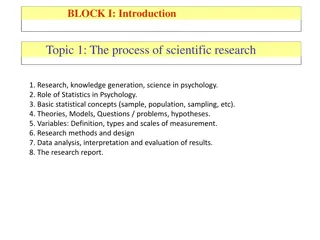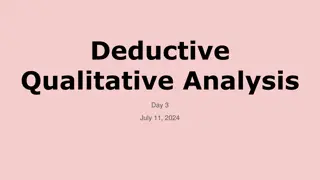Inductive and Deductive Reasoning
Inductive reasoning involves drawing general conclusions from specific observations, while deductive reasoning starts with general premises to derive specific conclusions. Induction uses experience or experimental evidence to make broad conclusions, while deduction follows from general to specific.
7 views • 7 slides
Topic : Distinction between Modern and Traditional Logic.
Logic, as a normative study, focuses on distinguishing correct reasoning from incorrect. Traditional logic, based on Aristotle's work, emphasized syllogistic reasoning, while modern logic, pioneered by figures like Leibnitz and Russell, employs mathematical methods and symbolic logic for a more adva
10 views • 10 slides
Engaging with Critical Thinking in Short Stories
Explore different ways of responding to short stories, from diary entries to role-playing, while honing critical thinking skills like deductive and inductive reasoning. Delve into character analysis, themes, and personal reflections to enhance understanding and engagement with the author's work.
7 views • 32 slides
Challenges in Philosophy of Science: Explanation and Induction
The field of philosophy of science grapples with various issues, including the Problem of Explanation and the Problem of Induction. Aristotle's views on scientific explanation and the deductive-nomological model are discussed. The reliance on induction in science, drawing general conclusions from li
3 views • 11 slides
Mastering the Toulmin Method for Constructing Persuasive Arguments
Learn how to effectively structure arguments using the Toulmin Method, which consists of Claim, Data, Warrant, Backing, Counterclaim, and Rebuttal elements. Explore reasoning and logic concepts, differentiate between inductive and deductive reasoning, and understand how to construct valid arguments
6 views • 30 slides
Esti-Mystery Number Sense Clue Challenge
Explore the Esti-Mystery challenge where you narrow down the possibilities of the number of game pieces based on a series of clues. Use estimation and deductive reasoning to reach the final answer of 47 game pieces. Engage in a fun and educational activity designed to enhance number sense and critic
1 views • 6 slides
Institutionalism and Methodological Issues in Political Science
Institutionalism is a foundational concept in political science, emphasizing the study of governing institutions and their role in shaping political behavior. It explores inductive and deductive approaches to research, highlighting the significance of empirical evidence and theoretical assumptions.
4 views • 19 slides
Evolution of Language Teaching Methods: From Grammar Translation to Direct Method
Explore the historical development of language teaching methods, starting from the traditional Grammar Translation Method to the innovative Direct Method alongside key figures and principles. The transition from text-focused, deductive grammar teaching to conversational, inductive approaches marks a
9 views • 89 slides
Pedagogical Analysis of Sets in Mathematics: Key Concepts and Teaching Strategies
Explore the pedagogical analysis of SETS by Dr. Meena Sharma, focusing on major concepts like the meaning of SET, SET notation, classification of SETS, and fundamental operations. Understand minor topics such as examples of sets, SET notation methods, and types of SETS. Objectives include defining S
2 views • 8 slides
The Fundamentals of Research: A Comprehensive Overview
Research is a systematic inquiry aimed at understanding, describing, explaining, and predicting phenomena using scientific methods. It involves both inductive and deductive approaches, with a focus on logical reasoning and real-time data collection. Key characteristics include a systematic approach,
5 views • 11 slides
Deductive Reasoning and Problem Solving in Logic
Explore the concepts of deductive reasoning, problem-solving logic, and Venn diagrams in this informative content. Learn about the process of drawing conclusions from known facts, using syllogisms to make valid arguments, and understanding the difference between truth and validity in deductive reaso
18 views • 16 slides
Assessing Technology Acceptance Model (TAM) Impact on Customer Satisfaction: A GCC Student Case Study
This research project aims to evaluate the influence of the Technology Acceptance Model (TAM) on customer satisfaction, specifically focusing on GCC students using a book rental system on a mobile platform. The study addresses the lack of research on students' preferences for obtaining textbooks and
26 views • 13 slides
Symbolic Logic: A Modern Approach
Delve into the world of symbolic logic where traditional and modern approaches differ. Learn how symbolic languages help overcome challenges with natural languages, leading to a clearer understanding of deductive reasoning through the analysis of premises, conclusions, compound statements, and logic
5 views • 32 slides
Mastering the Art of Academic Writing
Understand the essence of academic writing, focusing on problem-solving, deductive reasoning, and evidence-based arguments. Learn the purpose, methodology, and key tips to enhance your writing quality and presentation in academic settings.
4 views • 21 slides
CS 345 Lecture 1: Introduction and Math Review
This content encompasses the introduction and mathematical review covered in CS 345 lecture 1, including topics such as sets, sequences, logarithms, logical equivalences, and proofs. It delves into sets theory, mathematical operations, deductive reasoning, and examples like the conjecture of even nu
0 views • 68 slides
Advancements in Program Analysis Beyond Deductive Methods
Explore the evolution of program analysis beyond deductive methods with innovative tools like static analyzers and data-driven analysis design. Discover the challenges faced, such as undecidable analysis questions and scalability issues, and the strategies employed to address them. Learn about the s
2 views • 24 slides
Deductive and Inductive Reasoning
Explore the world of deductive and inductive arguments through examples of deductive reasoning based on definitions and math, including categorical syllogisms, hypothetical syllogisms, and disjunctive syllogisms. Delve into inductive reasoning and the key distinctions between deductive and inductive
2 views • 26 slides
Deductive Reasoning and Intuitive Logic
Deductive reasoning involves assessing the validity of arguments based on premises, while fluency-mediated intuitive logic suggests people have an intuitive sense of logicality. Challenges arise in drawing correct conclusions from abstract syllogisms, indicating a need for deliberate and effortful p
1 views • 24 slides
Deductive and Inductive Reasoning in Problem-Solving
Explore the differences between deduction and induction in problem-solving approaches. Deductive reasoning starts with a general statement and moves to specifics, offering certainty and objectivity, while inductive reasoning begins with specifics and arrives at a generalization, providing flexibilit
4 views • 11 slides
Framework for Ontology Learning from Big Data with IDRA
IDRA (Inductive Deductive Reasoning Architecture) presents a comprehensive framework for ontology learning, focusing on data modeling and architecture components. ETL (Extract Transform Load) processes play a vital role in semantic enhancement of data, especially in identity and access governance co
0 views • 25 slides
Logic in Mathematics and Deductive Reasoning
Delve into the principles of logical deduction in mathematics through examples of conditional statements, syllogisms, and proofs. Explore how deductive reasoning can lead to valid conclusions based on given premises.
0 views • 12 slides
Enhancing Simulation Learning Through Effective Debriefing Practices
Debriefing in simulation-based education plays a crucial role in improving learning outcomes and psychological safety. This approach focuses on perceptions, experiences, and expectations, utilizing a combination of deductive and inductive methods. Key findings suggest that faculty support and a supp
5 views • 18 slides
Economic Models: Assumptions, Deductive Reasoning, and Logical Fallacies
Economic models utilize deductive reasoning to simplify real-world economic relationships. Assumptions vs. implications are key components, where assumptions reflect reality or are simplifying. This process helps identify conditions for specific outcomes to occur and distinguishes between consequent
6 views • 17 slides
Scientific Method and Objective Approach
Explore the steps of the scientific method, importance of objectivity, and key concepts like hypothesis, null hypothesis, accuracy, precision, and sample size. Distinguish between inductive and deductive reasoning, as well as theory versus natural law in scientific research.
6 views • 12 slides
Universal Instantiation in Deductive Reasoning
Universal instantiation is a crucial tool in deductive reasoning, allowing us to derive specific conclusions from general statements. By combining universal instantiation with modus ponens and modus tollens, we can construct valid arguments such as universal modus ponens and universal modus tollens.
3 views • 13 slides
Enhancing Reader Comprehension in Audit Report Writing
Tools for improving reader comprehension in audit report writing, including deductive writing, economy of words, and descriptive headings. Learn the difference between inductive and deductive writing and how to make audit reports more engaging and informative. Practical examples provided.
3 views • 43 slides
TYPES OF REASONING DEDUCTION AND INDUCTION
Reasoning involves a connected sequence of thoughts leading to a conclusion. Deductive reasoning moves from general to specific, identifying assumptions and hidden premises. Categorical syllogisms demonstrate valid and sound argument structures, while real-life arguments may require uncovering assum
5 views • 21 slides
2-4 Deductive Reasoning
Deductive reasoning entails drawing logical conclusions from given statements or facts. This involves applying the Law of Detachment and Law of Syllogism to deduce new information based on established truths. Through examples and visuals, explore how these principles guide reasoning processes and le
3 views • 10 slides
Deductive Arguments: Truth Tables for Logical Operators
In deductive reasoning, truth tables are used to determine the validity of compound statements formed from simple statements using logical operators. By listing all possible values and outcomes, we can analyze the truthfulness of statements like AND, OR, and IF...THEN. Explore the concepts with exam
5 views • 12 slides
Methods of Teaching Mathematics by Dr. Meena Sharma
This content delves into the methods of teaching mathematics, specifically focusing on the inductive-deductive method as explained by Dr. Meena Sharma. It elaborates on both inductive and deductive methods, highlighting their differences and applications in teaching math effectively. The content dis
2 views • 5 slides
Research Methods and Approaches in Microbiology Class 2022-2023
Research in microbiology involves inductive and deductive methods, with a focus on qualitative and quantitative approaches. Inductive research starts with data collection to generate hypotheses, while deductive research begins with theory-driven hypotheses. Qualitative research centers on understand
9 views • 9 slides
Scientific Research in Psychology: Knowledge Generation and Methods
Scientific research in psychology involves the process of knowledge generation through the use of the scientific method. This includes understanding the role of statistics, basic statistical concepts, theories, variables, research methods, data analysis, and the importance of research reports. The c
0 views • 37 slides
Deductive Qualitative Analysis: When and How to Use It
Learn about deductive qualitative analysis, when to use a deductive approach, using pre-established codebooks, examples of deductive approach in hand hygiene research, and the deductive coding process. Discover the benefits, limitations, and FAQs associated with deductive analysis to enhance your re
0 views • 11 slides
Deductive Reasoning: Logical Conclusions & Syllogisms
Explore deductive reasoning with examples of logical conclusions using the Law of Detachment and Law of Syllogism. Learn to draw conclusions based on given information about angles, figures, and relationships. Enhance your problem-solving skills in geometry and logic.
1 views • 10 slides
Inductive and Deductive Reasoning
Explore the differences between inductive and deductive reasoning, where inductive involves making general statements from specific cases and deductive involves deriving specific instances from general statements. Learn how to identify and apply each type of reasoning through examples and explanatio
2 views • 13 slides
Research Methods and Examples
Research is a systematic inquiry using scientific methods to describe, explain, predict, and control observed phenomena. It involves inductive and deductive methods, aiming to gather insights for various purposes such as identifying customers, setting goals, and addressing business challenges. Good
1 views • 31 slides
Research Approaches: Deductive, Inductive, and Abductive Methods Explained
Explore the three main research approaches - Deductive, Inductive, and Abductive - with detailed explanations of each method. Learn how these approaches influence the research process from hypothesis formulation to data analysis.
1 views • 11 slides
Mastering Deductive Reasoning: Laws of Detachment and Syllogism
Dive into the world of deductive reasoning using the Law of Detachment and Law of Syllogism. Understand how to logically derive conclusions from given statements or facts, empowering you to make valid deductions. Explore examples applying these laws in practical scenarios. Enhance your critical thin
5 views • 5 slides
Deductive Approach to Processing High-Level Activity Queries in UAV Networks
Explore a deductive approach for processing high-level activity queries in UAV networks, focusing on representing and optimizing queries in an energy-efficient manner for distributed evaluation. The model involves UAVs detecting local activities through sensors, with queries translated into distribu
3 views • 15 slides
Set Theory in Logic: Exploring Deductive and Formal Logic
Discover the role of set theory within deductive and formal logic, including traditional and modern symbolic logic. Learn about set theory's fundamental concepts and how categorical propositions are interpreted in the context of set theory.
0 views • 5 slides
